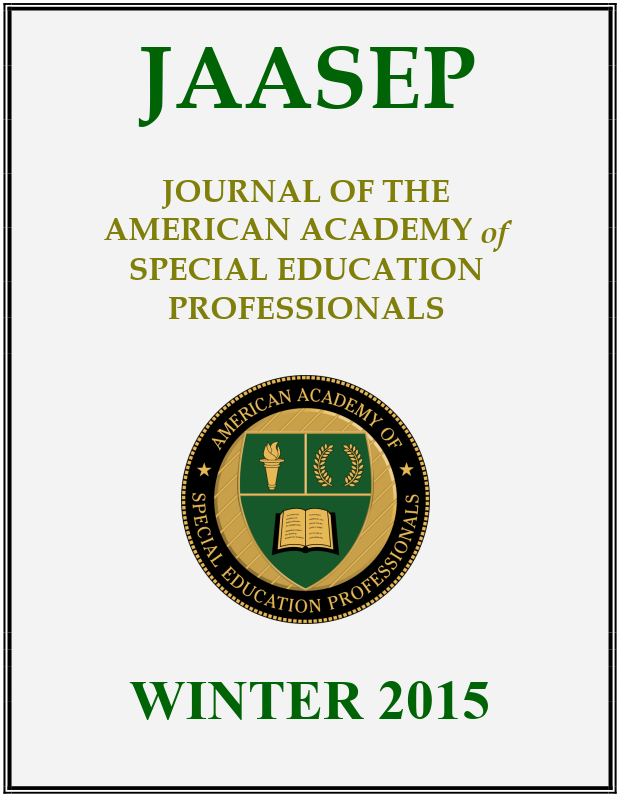Perceptions of Disability and Special Education Services: The Perspectives of Korean-American Parents of Children with Disabilities
Americans with Disabilities Act. (1990). Pub. L. No. 101-336, 104 Stat 327.
Callicott, K. J. (2003). Culturally sensitive collaboration within person-centered planning. Focus on Autism and Other Developmental Disabilities, 18(1), 60-68. DOI: https://doi.org/10.1177/108835760301800108
Cho, S. J., Singer, G. H. S., & Brenner, M. (2000). Adaptation and accommodation to young children with disabilities: A comparison of Korean and Korean-American families. Topics in Early Childhood Special Education, 20(4), 236-249. DOI: https://doi.org/10.1177/027112140002000404
Cho, S. J., Singer, G. H. S., & Brenner, M. (2003). A comparison of adaptation to childhood disability in Korean immigrants and Korean mothers. Focus on Autism and Other Developmental Disabilities, 18(1), 9-19. DOI: https://doi.org/10.1177/108835760301800103
Cho, S. J., & Gannotti, M. E. (2005). Korean-American mothers’ perception of professional support in early intervention and special education programs. Journal of Policy and Practice in Intellectual Disabilities, 2(1), 1-9. DOI: https://doi.org/10.1111/j.1741-1130.2005.00002.x
Choi, G. H., & Lam, C. S. (2001). Korean students’ differential attitudes toward people with disabilities: An acculturation perspective, International Journal of Rehabilitation Research, 24, 79-81. DOI: https://doi.org/10.1097/00004356-200103000-00012
Cloud, N. (2002). Culturally and linguistically responsive instructional planning. In A. J. Artiles and A. A. Ortiz (Eds.), English language learners with special education needs: Identification, assessment, and instruction (pp. 107-132). Washington, DC, and McHenry, IL: Center for Applies Linguistics and Delta Systems. 48 Erickson, J. G., Devlieger, P. J., & Sung, J. M. (1999). Korean-American female perspectives on disability. American Journal of Speech-Language Pathology, 8, 99-108. DOI: https://doi.org/10.1044/1058-0360.0802.99
García, S. B., & Malkin, D. H. (1993). Toward defining programs and services for culturally and linguistically diverse learners in special education. Teaching Exceptional Children, 26(1), 52-58. DOI: https://doi.org/10.1177/004005999302600113
Hoeffel, E. M., Rastogi, S., Kim, M. O., & Shahid, H. (2012). The Asian population: 2010 (2010 Census Briefs). U.S. Department of Commerce, Economic and Statistics Administration, U.S. Census Bureau. Washington, DC.
Hopstock, P. J., & Stephenson, T. G. (2003). Descriptive study of services to LEP children and LEP children with disabilities: Native languages of LEP children (Special Topic Report #1). Arlington, VA: Development Associates, Inc.
Hwang, S. K., & Charnley, H. (2010). Making the familiar strange and making the strange familiar: Understanding Korean children’s experiences of living with an autistic sibling. Disability & Society, 25(5), 579-592. DOI: https://doi.org/10.1080/09687599.2010.489305
Individuals with Disabilities Education Improvement Act (2004), Pub L. No. 108-446, 20 U.S.C. § 1400 et seq.
Kim, K. H., Lee. Y. S., & Morningstar, M. E. (2007). An unheard voice: Korean American parents’ expectations, hopes, and experiences concerning their adolescent child’s future. Research & Practice for Persons with Severe Disabilities, 32(4), 253-264. DOI: https://doi.org/10.2511/rpsd.32.4.253
Kim, T. Y., & Horn, E. M. (2008). Families’ perceptions of community inclusion of their young children with disabilities: A comparison of Korean and American families. The Journal of Special Education: Theory and Practice, 9(4), 285-310.
Lamorey, S. (2002). The Effects of Culture on Special Education Services Evil Eyes, Prayer Meetings, and IEPs. Teaching Exceptional Children, 34(5), 67-71. DOI: https://doi.org/10.1177/004005990203400511
Lee, S. H., Turnbull, A.P., & Zan, F. (2009). Family perspectives: Using a cultural prism to understand families from Asian cultural backgrounds. Intervention in School and Clinic, 45(2), 99-108. DOI: https://doi.org/10.1177/1053451209340216
Park, J. Y, & Turnbull, A. P. (2001). Cross-cultural competency and special education: Perceptions and experiences of Korean parents of children with special needs. Education and Training in Mental Retardation and Developmental Disabilities, 36(2), 133-147.
Park, J. Y., Turnbull, A. P., & Park, H. S. (2001). Quality of partnerships in service provision for Korean American parents of children with disabilities: A qualitative inquiry. The Association for Persons with Severe Handicaps, 26(3), 158-170. DOI: https://doi.org/10.2511/rpsd.26.3.158
Shin, S. W., & Koh, M. S. (2008). A cross-cultural study of students’ behaviors and classroom management strategies in the USA and Korea. The Journal of the International Association of Special Education, 9(1), 13-27.
U. S. Department of Education. (2009). 31st annual report to Congress on the implementation of the Individuals with Disabilities Education Act. Washington, DC: Author.
You, H. K., & McGraw, L. A. (2011). The intersection of motherhood and disability: Being a “good” Korean mother to an “imperfect” child. Journal of Comparative Family Studies, 42(4), 579-598. DOI: https://doi.org/10.3138/jcfs.42.4.579
Zhang, C., & Bennett, T. (2003). Facilitating the meaningful participation of culturally and linguistically diverse families in the IFSP and IEP process. Focus on Autism and Other Developmental Disabilities, 18(1), 51-59. DOI: https://doi.org/10.1177/108835760301800107
Downloads
Article Information
- Article Type Articles
- Submitted December 30, 2014
- Published February 15, 2015
- Issue Winter 2015
- Section Articles
